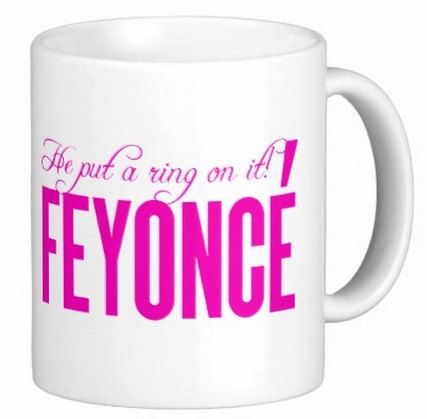Queen Beyoncé is in the news again, this time dealing with her privacy and trademark rights and ultimately wanting protection for her brand. As outlined in a recent TMZ article, a company called Feyoncé has begun selling merchandise with said name on their products, even making a coffee mug that sports “He Put a Ring On it,” a reference to Beyoncé’s hit song “Single Ladies.” While there is some merit to her claim that the company is profiting commercially from the use of her likeness, the notion that a silly company with a few goofy products is damaging to her brand is likely seen as a far stretch. In contrast to Beyoncé’s intentions, such a claim only illustrates that the company’s name is satire and in the eyes of the law, this ultimately could dispel any claim she has to a trademark suit, copyright infringement, or a right to privacy suit dealing with the misappropriation of her likeness.
Apparently Beyoncé’s camp has issued a ‘‘cease and desist’’ letter to the company. For all the non-lawyers out there, a cease and desist letter is no different then a demand letter, or a formal request to stop all alleged infringing conduct. Now the truth of the matter is these letters mean very little, and in practice, yield even fewer results. At this point, these letters are only used as a procedural step to ultimately show to a court that the non-infringing party attempted to resolve this issue privately and without the courts assistance. In practice, individuals or companies respond to an actual complaint being filed in superior court. Thus, Beyoncé and her camp will have to get used to Feyoncé’s campaign, at least for the time being.
There are two primary claims that Beyoncé could bring against Feyoncé, trademark infringement and misappropriation of likeness (a privacy tort). Traditionally, there are three ways of protecting ideas or products: copyright, trademarks, and patents. In this case, Beyoncé is claiming her trademarked name / brand is being infringed upon by Feyoncé. In a trademark case, the plaintiff has the burden of proving that the defendant’s use of a mark has created a likelihood-of-confusion regarding the origin of the defendant’s goods. The plaintiff then must show that the defendant is using a confusingly similar mark in such a way that it creates a likelihood of confusion, mistake, or deception with the consuming public. The confusion created can be that the defendant’s products, or in this case the use of Beyoncé’s name and lyrics, leads to a valid infringement suit. Courts will examine the similarity in the overall impression created, including comparing the similarities of the goods and names involved, including any evidence of actual confusion by consumers; the intent of the defendant in adopting the mark; the degree of care likely to be exercised by consumers; and the likelihood of expansion of the product lines to the stream of commerce.
The second claim that Beyoncé can bring against Feyoncé is the misappropriation of likeness of her brand / name. This unauthorized publication of name or likeness may be the most common privacy tort claim in our legal community. It is important to note that this common law right is not limited to the appropriation of name or likeness, but instead the major issue revolves around the appropriation of the plaintiff’s identity. This common law cause of action consists of proving 1) the use of the plaintiff’s identity, 2) the misappropriation and benefit of plaintiff’s name or likeness for the defendant commercially (or otherwise,) 3) lack of consent by the plaintiff, and 4) resulting injury. Based on these elements, Beyoncé’s camp could have a rightful claim of invasion of privacy, however most of the showing by Beyoncé will be fact determinative and based on the evidence compiled by her team.
Beyoncé’s claim might be the facet of this story that inhibits her ability to be victorious under the judicial system. Feyoncé’s coffee mug is clearly a joke to her famed song, which quite honestly made this reader laugh. The reason such claim could ultimately lose in court is because of the affirmative defense of parody. Trademark parody involves the appropriation of another’s mark as a well known element of popular culture, and then building on it to contribute something new for humorous effect or social commentary. This defense allows shows like Family Guy, South Park, and even the Simpsons to make jokes about celebrities without any legal ramifications. The question remains if Feyoncé’s conduct and merchandise will fall under the parody defense, or can Beyoncé and her team meet all the elements needed to request equitable relief, namely an injunction for copyright infringement against the use of her brand.
-Kevin Lipton, ESQ
Managing Partner – Lipton Legal Group, A PC – Beverly Hills, California

